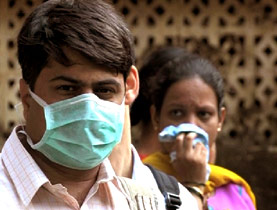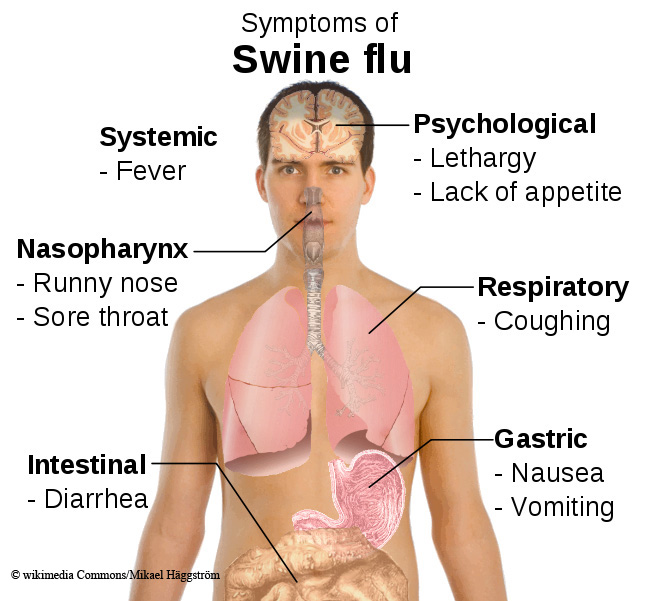India tightens its grip on Tamiflu

Swine flu test centres in India are swamped and face mask stocks are running out, but it is access to the Swiss antiviral drug Tamiflu that is causing the most fuss.
Tamiflu is one of two antiviral drugs said to be effective in treating the A/H1N1 flu virus that has reached pandemic levels worldwide.
In one doctor’s office in Mumbai, the capsules are so precious they are kept locked in a safe. Doctor Charulata Jakhia has the key on her at all times.
“It’s safest: if all my staff had access to Tamiflu, it would disappear and we would see it appear on the black market. Today, everyone with money wants to buy it – as a precaution.”
Jakhia is responsible for the distribution of Tamiflu in the district of Bandra East, one of the most populated areas in this large Indian city. She is responsible for the health of around 100,000 people but her practice only stocks around one hundred doses.
“It is enough to treat a dozen patients. The government has promised to give us more, but for now hopefully we manage.”
Although India has more than one billion inhabitants, the government only has reserves capable of treating 250,000 patients. Of the ten million pills in state hands, 7.5 million have already been distributed.
“As the virus is highly contagious, when a person falls ill, one is obliged to provide anti-viral drugs for all family members and house staff. In India, that’s easily ten to 15 people,” said Jakhia.
With its population density, poor hygiene and ill-informed inhabitants, India has all the ingredients necessary for a rapid spread of the virus.
Generic brands
To cope with the pandemic, which has already affected more than 2,500 people across the country and killed 50 within a fortnight – the government has decided to acquire 30 million more doses – an order worth more than SFr20 million ($18.7 million).
But the government has already announced it will not only be approaching Roche, the Tamiflu patent holder. Vineet Chowdhury, joint secretary at the ministry of health told swissinfo.ch that the authorities had “decided to buy generic Tamiflu from all businesses in the market and as much as they can produce”.
That means the government will use all the Indian laboratories that manufacture generic brands – good news for the local pharmaceutical industry, which had been waiting for such an announcement for months.
To date, Roche had allowed only one Indian company to provide the government with Fluvir, a local version of Tamiflu. Based in Hyderabad – India’s medicine producing hub – Hetero Drugs is the only pharmaceutical company in the country to have received a licence from the Basel-based group to produce and export a generic brand.
It has been able to produce Tamiflu since 2005 “in the event of a pandemic, and only for Third World countries”, clarified a spokesman for Roche.
But for several months, three other Indian laboratories have been saying they are able to produce the anti-viral drug in large quantities. They soon hope to sell their versions in the Indian market – which would end a de facto monopoly of Roche and Hetero Drugs (which pays a percentage of its turnover in Swiss group).
The chairman of Cipla, one of the oldest pharmaceutical companies in the country, for example announced in October 2005 that he was ready to launch a generic version under the name Antiflu.
High stakes
To what extent do these companies they have the right to produce generic versions of Tamiflu and can India – or other governments – buy them in the event of a pandemic?
“The situation is confusing: contradictory information is circulating about Tamiflu,” explained Philippe Ducor, a lawyer specialising in intellectual property rights.
“Nothing obliges a country to recognise a patent, it is a national decision. India rejected the patent on Tamiflu at the start of the year. Roche now has the right to appeal. Indian companies can therefore theoretically produce generics, if they obtain authorisation from the Indian government, but they face having to pay damages if an agreement is finally reached.”
Roche is currently refusing to comment on the existence of Tamiflu copies, only confirming that they have given licences to three companies in the world, two in China and India.
Within the context of the swine flu pandemic, which is affecting more and more countries, billions of dollars are at stakes in this commercial war. India is preparing to produce remedies on a massive scale, not only for its domestic needs, but also for export throughout Asia and Africa. The Indian-produced generic brand of Tamiflu is already on sale in Malaysia and Oman.
And the conflict between Indian and Swiss laboratories could deepen if one particular discovery is confirmed: the finding that trees with leaves containing the main ingredient for Tamiflu, normally grown in China, would also be perfectly suited to the climate of the south coast of the India.
Clementine Mercier in Mumbai, swissinfo.ch (Translated from French by Jessica Dacey)

More
Pandemic
The first case of A/H1N1 flu appeared in India at the start of June. The government has put in place checks at international airports in order to identify infected people arriving from abroad.
On August 3, a 14-year-old girl from Pune, near Mumbai, was the first to die in India. At that moment the authorities realised that the measures in place were not sufficient and that the pandemic was spreading inside India.
Within two weeks more than 50 people had died from the virus, of which 31 were in the Mumbai state of Maharashtra. During the same time, almost 3,000 Indians tested positive for the virus.
To halt the spread, the authorities closed 1,400 schools in Mumbai for ten days and cinemas, theatres for three days. In various regions across the country doctors were told to administer Tamiflu to all suspected cases even if the virus was not yet confirmed.
The country has been overtaken by the speed by which the virus spreads. The time it takes for diagnosis went from 24 hours to 3-5 days. Some people died before their test results returned.
Swine flu was declared to be a pandemic by the World Health Organization in June, and it is expected to make a strong return in the autumn and winter. The WHO has said the virus has killed at least 1,800 people worldwide and around 180,000 have been infected. The first vaccines have been distributed to Britain and France.
Tamiflu is one of two antiviral drugs, along with Relenza, said to be effective against the so-called swine flu. Each pack of Tamiflu, also known as oseltamivir, is enough for one course of treatment for the viral infection.


In compliance with the JTI standards
More: SWI swissinfo.ch certified by the Journalism Trust Initiative




You can find an overview of ongoing debates with our journalists here. Please join us!
If you want to start a conversation about a topic raised in this article or want to report factual errors, email us at english@swissinfo.ch.